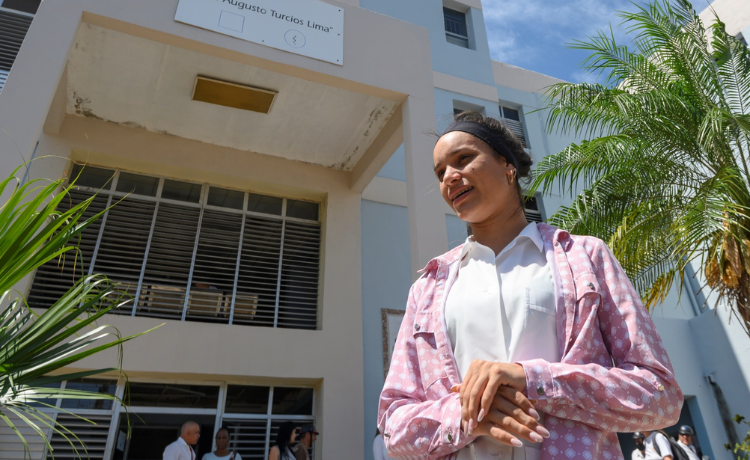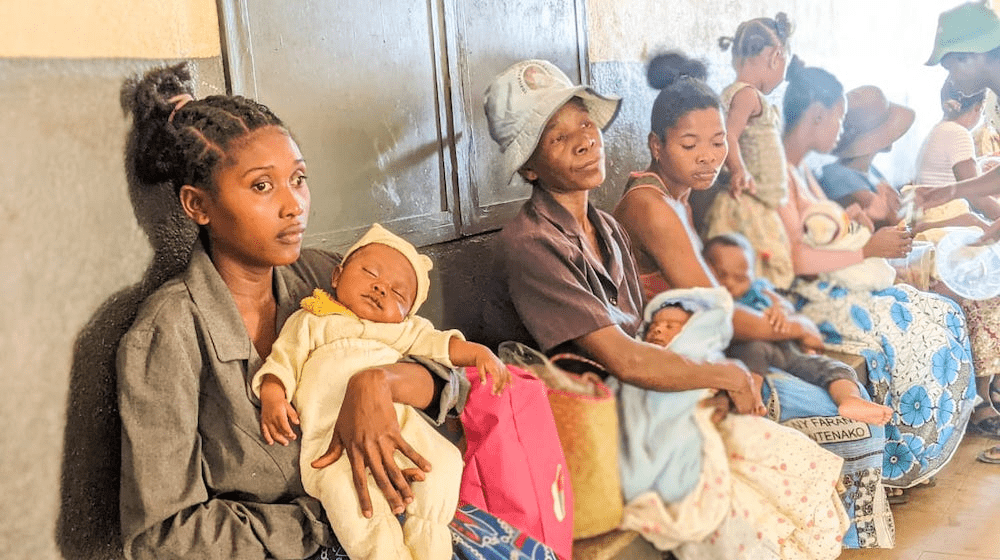UNITED NATIONS, New York – Across dozens of countries, the global climate crisis is not impending – it has arrived. In 2023, climate disasters drove millions of the world’s most vulnerable women and girls from their homes, exposing them to threat of sexual and gender-based violence, harmful practices like child marriage and preventable death during pregnancy and childbirth.
New data from UNFPA, the United Nations sexual and reproductive health agency, and the Internal Displacement Monitoring Centre reveal that more than a third of displacements in 2023 involving women and girls and driven by crises such as floods, cyclones and earthquakes occurred in countries at the highest risk of climate emergencies, but least prepared for them.
"The climate crisis is making the world more dangerous for everyone, and in countries hardest hit, it is women and girls who suffer most,” said UNFPA Executive Director Dr. Natalia Kanem. “As storms, floods, droughts and wildfires displace them from their homes, life-saving health services, safe spaces, education and livelihood opportunities can fall out of reach. Women and girls are on the front lines of the climate emergency, and this new analysis is a reminder that their needs must not be ignored.”
See more on climate change’s severe impacts for women and girls
Not all natural catastrophes can be planned for, and some may have no connection to climate change (although scientists are increasingly researching the links between earthquakes and droughts).
But it is possible – and crucial – for societies to anticipate extreme weather events and disasters and include women and girls and their needs in emergency response planning. Here are three that humanitarian actors must prepare for when responding to a crisis.
1. Shelter and safety

Just two natural disasters drove over one quarter of displacements in 2023: the twin earthquakes that rocked Syria and Türkiye in February, and Cyclone Mocha, which smashed into Myanmar and Bangladesh in May.
Mother-of-five Azra* was one of more than 2 million women displaced by the catastrophic quakes in Türkiye. Left with few options for shelter, Yasmin was forced to move in with her husband, from whom she had filed for divorce by obtaining a restraining and protection order.
Although this helped to protect her from the elements in the aftermath of the earthquakes, Yasmin’s vulnerability to another kind of harm arose in her husband’s home: his threats and abuse. With UNFPA support, she and her children were relocated to a women’s and girls’ safe space to stay. “We had to escape both the earthquake and my husband,” she told UNFPA. “Thank God, he doesn’t know we’re here now. I know I am safe.”
Months later, in advance of Cyclone Mocha’s devastating landfall in Bangladesh, UNFPA community volunteer Yasmin Akhter encouraged female refugees living at the Nayapara camp, where she is stationed, to take shelter at a UNFPA-supported women-friendly space. The facility, known as Shanti Khana – ‘the home of peace’ in English – also provided temporary refuge for female members of Ms. Akhter’s own family amid the pummeling winds and rain.
“I am here to support the community, to make them aware of the potential threats that women and girls face, and how to prevent them,” Ms. Akhter said. “Once I heard about the cyclone, it was impossible for me to stay home."
2. Access to safe birth

Floods, tornados, hurricanes, earthquakes, wildfires: Childbirth doesn’t stop for any of these.
This is something Nasreen Faroug Balla knows very well, having gone into labour one month after rainy season floods swept across Gedaref State in Sudan in July 2022, cutting hundreds of villages off from access to essential services and healthcare.
Once her labour pangs began, Ms. Faroug Balla had to be carried 3km through the rain and mud to reach a UNFPA-supported field hospital. In the delivery room, her blood pressure skyrocketed and she fainted; doctors rushed to perform an emergency Caesarean section.
“This field hospital saved my daughter’s life,” Ms. Faroug Balla’s mother told UNFPA. “Without it, I do not think she would have survived.”
Thousands of kilometres south in Madagascar, 26-year-old Georgette also gave birth amid natural disaster, going into labour just as Tropical Cyclone Freddy ripped through her village in February 2023.
Fortunately, Georgette wasn’t at home – she had evacuated to an emergency shelter before the cyclone made landfall. It was here, in the bathrooms of a converted school compound, that Georgette became a mother for a second time, naming her newborn son Freddy.
Midwife Lydia Rabitarivao, who was working at the UNFPA-supported health centre in Maroalakely, provided the mother and baby essential postnatal care. “Both are doing very well,” Ms. Rabitarivao said. “We gave them the necessary first aid and went back in the afternoon for a check-up.”
3. Contraceptives

It is a common refrain amid displaced populations: “We fled with nothing.” Running for your life means leaving everything behind, from food, water and clothing to essential reproductive health supplies like birth control and menstrual pads.
UNFPA works to fill these gaps and ensure women’s sexual and reproductive health needs in emergencies do not become afterthoughts. In the context of displacement, which often robs women and girls of their safety nets, livelihoods and health, the ability to manage menstruation and plan pregnancies can be literally life saving.
“Life is already difficult. We have to fight daily for survival,” said 26-year-old Gabdaibe Thibothe, who visited the maternity ward at the Kalambari refugee camp in Chad in search of family planning services.
Kalambari hosts more than 9,000 people, many of whom fled neighbouring Cameroon after conflict reignited in 2021 over dwindling resources in the northeast – particularly water, which has become scarce amid drought in the Lake Chad basin.
“Thanks to the midwives’ awareness raising, I understood that by spacing out the births of children, families can better provide for their needs in terms of education and health,” Ms. Thibothe told UNFPA.
Halfway around the world, Adriana Martínez Echavarría expressed a similar sentiment in the aftermath of Hurricane Ian, which made landfall in Cuba in September 2022 and tore the roof off the 20-year-old’s house. A medical biophysics student, Ms. Martínez Echavarría knew reproductive autonomy was critical to continuing her studies – but local pharmacies were out of the birth control tablets she’d been taking.
With UNFPA support, Ms. Martínez Echavarría obtained a contraceptive implant at the Turcios Lima clinic in Pinar del Río. “I’m about to graduate and I have many personal and professional and plans ahead of me,” she told UNFPA. “It’s not that it’s a bad thing, but I don’t want to have children yet.”
“I hope that my children will arrive when I am able to receive them.”
The 29th United Nations Climate Change Conference (COP29) is a pivotal opportunity to accelerate action to tackle the global climate crisis. At the event in Baku, Azerbaijan, UNFPA will call on global leaders to prioritize the needs of women and girls amid climate disasters; provide adequate financial support to vulnerable countries to address climate change impacts and build resilience; and to include women and youth in decision-making processes and leadership on climate action.
*Names have been changed


